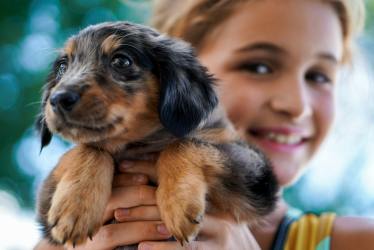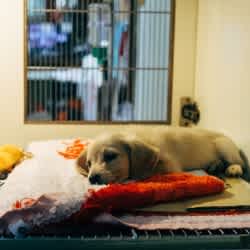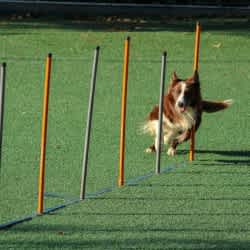What you should pay attention to when buying a dog

What kind of dog is right for me?
First, what kind of dog is best for you and the people in your home? What exactly are you looking for, a dog to cuddle, to walk with, or a buddy for the children? Some dogs are better suited to a sporty family that enjoys being outside and exercising, other dogs are more calm and may be better suited for older people. Small sized dogs are often easier to take with you when travelling, or when you go out.
Either way, all dogs require time to be spent on them, they especially need to be let out several times a day, and preferably taken for a longer walk twice a day. Some dog types need more exercise than others. A dog should be fed two or three times a day and some breeds of dogs need to be brushed daily or even go to a doggy hairdresser (groomer).
A dog also needs space
Every dog needs the necessary space. If you have a small garden or no place outside for the dog to go, see if there is an area or park nearby where the animal can run and play. A great example of this would be a forest or heath. Larger urban areas often have special playgrounds for dogs in which the animals can run and play with each other.
Buying a dog: everyone in the home must have a say
Everyone in the house must support the purchasing of a dog. Allergies must be taken into account. Agree together who will be responsible for feeding, walking and brushing. Everyone must also be clear about the rules applicable to the four-legged friend to ensure everyone applies the same principles (for example, being allowed on the couch or not).

Choosing a dog: would you prefer a pedigree breed or a mongrel?
There are more than 350 recognised dog breeds, each with its own characteristics. It is important to do careful research and find out which breed will suit the family well. For example, check the website of the Landelijk Informatiecentrum Gezelschapsdieren at www.lig.nl [National Information Centre for Companion Animals] or the rashondengids at www.rashondengids.nl [pure-bred dog guide] where you can find plenty of information to help you make an informed decision and choose the dog that is best for you.
There are many dogs waiting for a new owner in dog shelters. Do not be influenced by fashion or cute videos, do plenty of research in advance. Be very careful when purchasing online, unfortunately there are many rogue traders among suppliers. And when you buy a puppy from a breeder, you must first check the puppy-checklist (https://www.licg.nl/honden/de-puppy-checklist/).
Health is a top priority when choosing a dog
When purchasing a dog, health is the most important factor. Some dog breeds – and crosses of certain breeds – have certain characteristics or hereditary conditions that make them extra sensitive to specific health problems (e.g. difficult breathing, heart problems, eye diseases, hip dysplasia and other joint disorders). The rashondengids [pure-bred dog guide] at www.rashondengids.nl provides comprehensive information about the characteristics of pure-bred dogs. In this website, you can easily find a pure-bred dog and read up about the character, health and possible hereditary conditions.

To school: also useful for dogs
It is advisable to socialise the dog as a puppy so he/she can learn the most important commands. A dog school can help you to educate the dog properly. Nothing is more annoying if a dog does not listen. These course will also teach you the best ways to deal with your dog. For a puppy, a course is also an ideal place to get to know other dogs, which is important for his/her socialisation. [Click here to find out more about what to look for when looking for a good dog school] (https://www.licg.nl/honden/hoe-vind-ik-een-goede-hondenschool/)here.
How much does a dog cost?
Finally, don’t forget: the costs. First, there are the one-time costs, such as purchase and basic necessities. These costs depend on the age, health and type of dog (build, size, coat type). The costs of the required materials (food bowl, drinking bowl, basket, collar & leash, brush) can also vary greatly due to the huge choice available.
Then there are recurring costs such as food, toys and periodic costs for visits to the vet (vaccinations, worm and flea remedies). Dog food is an important aspect, always get good advice from a pet store, veterinarian or animal nutrition expert. Please feel free to contact one of our HobbyFirst Canex employees.
If the dog does not go on holiday, the costs of a boarding house or dog sitter will be added. Also take into account unexpected costs such as illness or an accident. Insurance can be taken out for this.
The LICG (https://www.licg.nl/wat-kost-een-huisdier/#hond) has calculated that the one-off costs for purchasing a dog are about €300 to over €1,400, and that the recurring costs are around €580 per year, excluding castration, grooming and insurance. The amount will of course depend on your dog’s health and nutritional needs.